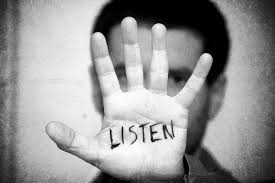 Our partner, Dr. Marty Rozelle, recently wrote an article on dialogue in community involvement and the importance of listening to others. Well, I consider myself a professional listener, so I thought I’d expand on that.
Our partner, Dr. Marty Rozelle, recently wrote an article on dialogue in community involvement and the importance of listening to others. Well, I consider myself a professional listener, so I thought I’d expand on that.
With my community involvement work, I do a lot of listening to others … Every couple of weeks I listen to groups talk – for 2, 4, 6 hours – about very technical subjects and each person’s very personal reactions to those, and I need to accurately document what happens. This requires an intensity of concentration and suspension of my own thought processes that’s, frankly, exhausting. And, for some reason that I don’t begin to understand, all my good friends and most of my relatives are big talkers. This is a blessing in many ways since it lets me off the conversational hook and allows me to have fun without much effort. However, I’ve learned that these people also expect me to apply the same concentration to their ramblings as I apply to my work. And that’s even more exhausting! By a show of hands, how many people have ever heard this from a loved one: “I told you that. You just don’t listen”? OK, maybe I didn’t. Because (a) you interrupted me in the middle of something else and I can’t shift gears that fast, (b) I can’t follow your story, it’s too convoluted, or (c) I’m taking a break from listening today.
My point is that listening is hard work. Most people are not born to be good listeners. We’re so much more interested in what we have to say than in anything someone else has to say. But you can’t be a good practitioner in public participation, issues management, conflict resolution, community involvement, mediation, or coaching unless you can listen effectively. Research shows that you can’t even work with difficult people if you can’t listen (see, for example, The Importance of Effective Listening: Implications for the Workplace and Dealing with Difficult People). Because, let’s face it, listening is about half of communication. The organization Skills You Need (Skills You Need: Listening) cites a statistic that adults spend an average of 70% of their time engaged in some sort of communication; of this, an average of 45% is spent listening compared to 30% speaking, 16% reading and 9% writing (Adler, R. et al. 2001).
It’s an axiom in our business that sometimes people just want to be heard. Let’s try harder to really hear them. Or, as I have so often wanted to say to so many people over the years: “Shut your mouth and open your ears!” We’ll explore the precepts of Active Listening as a proven way to do that next time …
Author: Debra Duerr
